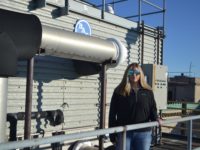In August, Nicole Parker, CPD, with Bloomfield, Connecticut-based BVH Integrated Services, and Brianne Hall, P.E., with Detroit, Michigan-based Fishbeck, Thompson, Carr & Huber, received a Special Award for Appreciation from ASPE.
pme recently chatted with Parker and Hall about their awards, how to get more women into the industry, what industry issues are on the top of their minds and more.
pme: How did it feel to be honored with the Special Award for Appreciation from ASPE? How important is your relationship with ASPE?
BH: I was surprised to be informed that I was receiving the Special Award of Appreciation from ASPE. It is an honor to be recognized and I am grateful for all of the support I have received. While I am the one being recognized, I have to give credit to the Eastern Michigan Chapter current and past board members, the ASPE Society Board of Directors, committee members, etc., that I have worked with for the last four-and-a-half years. As volunteers in the organization, it is often not a single individual working towards achieving a goal; it is a team effort.
NP: I was very surprised when I heard that received the special award of appreciation. Although I am a very active member, it was unexpected. My relationship with ASPE has become stronger over the years. In the beginning I didn’t know too many people and was not aware of the hard work that people put into keeping the Society afloat. Now that I am participating in many events and committees I have a whole new respect for all those who really make an effort to make ASPE a great team to be part. There are many people that have a tremendous passion for ASPE and that is a very positive thing.
pme: What are the biggest benefits you receive from being an active member within ASPE?
NP: One of the biggest benefits of being an active member of ASPE is networking. I always say that if I was ever to move anywhere in the U.S., I would have a contact from ASPE to help me find work. I have created some really great friendship through ASPE and I always know if I have a question I have a very large pool of intelligent people to choose from. Also, by becoming a CPD, I have been given an opportunity to advance in my career and to promote plumbing engineering to others in the engineering industry. ASPE has great educational programs for people at multiple levels of experience.
BH: The technical information/resources and the relationships I have developed throughout my membership. Looking back before I joined ASPE, while I had great resources at FTCH to learn plumbing design, it had its limitations. After joining ASPE, I formed relationships around the country which provided technical advice, encouraged my growth within the professional organizations and have helped me to become who I am today.
In addition, by joining ASPE, it led to my involvement with other professional organizations. I know that my career would not have progressed as it as if I had not become an ASPE member.
pme: When did you join ASPE? How did you hear of the Society?
NP: I joined ASPE in 2001. My boss at the time encouraged me to join so that I could take advantage of the educational technical seminars that were offered in order to help me advance in my career. I took the CPD exam in 2004 and attended my first ASPE Symposium in 2005 and have attended all the conventions since 2006.
BH: At FTCH, Paula Leatherman, CPD, is located in our Grand Rapids office (I am located in our Novi office, near Detroit) has assisted me in learning plumbing design. She is a member the Western Michigan ASPE Chapter and encouraged me to become a member. In March 2014, I decided I wanted to pursue my CPD certification and joined ASPE.
A week after joining, I inquired with the Eastern Michigan Chapter about a CPD review course and met John Nussbaum, IPP, FASSE, FASPE. He assisted in organizing a review course and in May 2014, I was sworn in as the Eastern Michigan Chapter vice president-technical. If John had not been as proactive connecting with me, assisting in organizing the CPD class and inviting me to attend the an Eastern Michigan Chapter Board meeting, I do not know how many years would have passed prior to becoming a chapter board member.
pme: In your opinion, what is the best way to encourage more women to join the industry?
BH: I believe that more awareness to the industry must be provided to students of all ages. I knew in elementary school that I wanted to be an engineer, but did not have a specific area of focus beyond mechanical engineering. I found this industry three years after graduating college and immediately knew it was the correct fit for me.
NP: I think just talking to other women and telling my story and my experience as an ASPE member would be the best way to encourage more women to join. I was a minority in a male-dominated industry and as a single mother there were many obstacles that I had to overcome in order to be where I am right now. Over the years more women are getting involved, treated more as equals and taking on roles on the Board at both the Chapter level and the National level.
pme: How has your career in the plumbing engineer industry evolved?
NP: I began working for a consulting engineering firm six months after graduating from college. Even though I had a degree in physics and math degree, and not an engineering degree, I was interested in pursuing engineering. Originally, I wanted to be an electrical engineer, but quickly changed my mind once I started working at an MEP engineering office. I was hired as just a CAD drafter and picked up quickly on the design of plumbing and fire protection systems and with some great mentoring by my boss at the time, I worked hard to learn the trade and soon became a plumbing engineer.
BH: In 2006, I took a job in the consulting industry with J.B. Wyble and Associates in Bethesda, Maryland, where I began learning HVAC design. In 2008, I took a position with FTCH and began learning plumbing design.
After becoming an ASPE member, my career as plumbing engineer quickly escalated. I joined the Code Study and Development Group of Southeastern Michigan and ASSE International-Michigan Chapter in 2015, serving as board members for both organizations. I have attend the 2015 and 2018 IPC Code Hearings. I serve as a member of the ASSE International Code Committee and Seal Board. I spent two years as the Eastern Michigan ASPE Chapter VP Technical, two years as chapter president and am currently running for the ASPE Society Board of Directors VP Legislative.
pme: Where do you see your career being in the five years? 10 years?
NP: My intentions in the next five years are to continue working as a plumbing engineer and continuing to educate myself with all the evolving technology. I would like to run for a position on the National Board of Directors for ASPE. I am very lucky to have an employer that encourages involvement and supports me. In 10 years, I would like to have passed my P.E. and possibly taken on the role of a project manager.
BH: It difficult to imagine where my career will be in five to 10 years, given how drastically it has developed over the last five years. However, in that timeframe, I hope the industry is at a point where women are recognized within the industry for their accomplishments/participation with less focus on the fact that they are a woman.
I am grateful for all recognition that I receive, including the opportunity to speak of my experience within this article. However, I would like to see the industry progress to the point where women are not as much of a minority in this field and there is more focus on individual accomplishments rather than how to encourage women to become involved in the industry and professional organizations. Perhaps it will be longer than five to 10 years, but I hope that we can achieve that in the future.
pme: What are some of the industry-related issues that keep you up at night? Why are these issues top of mind for you?
NP: My mind always seems to be running in several directions at night. Working in this industry you have to be able to react to problems and issues very quickly and be able to juggle several projects at one time. Sometimes when I am working on several projects at a time and they are similar in nature, I am always thinking about what I forgot to do as part of my design. No one ever designs a project with zero errors, there are always mistakes and omissions and I am always thinking about how to reduce the amount I make.
BH: Proposed legislation by individuals who do not understand the implications of their proposal. In Michigan, a bill proposal in 2016 was to eliminate annual testing of residential backflow preventers. Under the proposal, the devices would only be tested upon installation and after repairs.
However, approximately 88% of failures requiring repairs are determined by annual testing and by eliminating the annual testing it places the public at risk. The bill did not move forward in 2016. In 2018, a new bill is proposed to alter the requirements of residential irrigation system backflow preventers only requiring testing every four years after the initial installation and test. These types of proposals by legislators are working against the efforts of the plumbing industry to protect the public drinking water supply.
pme: What would your advice be to anyone on the fence about joining the plumbing engineer industry?
NP: I always tell the young mechanical engineers in my office that they are crazy not to join ASPE and that they should be trying to learn about plumbing. As a mechanical engineer they will eventually have to take responsibility for plumbing drawings and they really should be able to review them confidently. As engineers, we should have knowledge in all the trades and be able to understand everything that is involved in the building resulting in the end product.
ASPE is dedicated to the advancement of the science of plumbing engineering, to the professional growth and advancement of its members and the health, welfare and safety of the public.
BH: Reach out to your local ASPE chapter to connect with members or if an ASPE member participate in the ASPE Mentoring Program. Attend local ASPE chapter meetings, pursue co-op or internships at local firms that will allow you to work with a plumbing engineer and understand the day to day responsibilities. Develop a correspondence with an engineer in the industry that can provide answers to your questions and assist in guiding you on pursuing the career.




